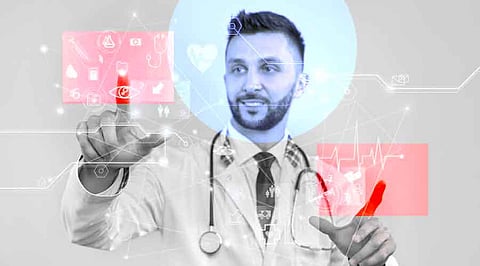

In the healthcare industry, the adoption of Generative AI is not just a choice but a necessity. This article explores the pivotal role Generative AI plays in healthcare automation, reshaping diagnostics, treatment approaches, and medical training. From personalized medicine to simulated training, discover how this technology is driving transformative innovation in healthcare practices.
AI revolutionizes drug development by addressing challenges like high costs and long timelines. Generative AI identifies potential drug targets, proposes novel compounds, and predicts interactions, expediting early stages. It streamlines lead optimization, supports personalized medicine through patient data analysis, and aids biomarker discovery. AI optimizes clinical trial design, integrates diverse data sources, predicts adverse effects, and identifies new uses for existing drugs, transforming drug development with efficiency and innovation.
Generative AI transforms healthcare research with synthetic medical data, mimicking real patient information without compromising privacy. Gen AI ensures realism and diversity in datasets, crucial for testing algorithms and validating healthcare systems. Customizable and privacy-preserving, it aids in training machine learning models ethically, addressing legal compliance challenges. This innovative approach provides a secure, controlled environment for advancing healthcare technologies without relying on actual patient records.
Artificial Intelligence in robot doctors represents a pivotal advancement in healthcare support, showcasing their capacity to rapidly absorb and recall extensive medical knowledge. These AI-driven robots aim to complement human doctors by offering quick and accurate information during patient consultations. While not replacing doctors, they signify a promising evolution in medical assistance and knowledge retrieval.
Generative AI transforms risk forecasting by leveraging real-time data and historical trends. Analyzing diverse sources, it predicts potential hotspots for disease outbreaks, enhances supply chain resilience, and optimizes resource allocation during crises. Gen AI's simulations and predictive analytics empower authorities to plan for various scenarios, providing a proactive and adaptive approach to mitigate risks effectively in dynamic and uncertain situations.
Medical imaging technologies play a vital role in modern healthcare, providing visual insights into the body for diagnosis and treatment. Despite their significance, challenges like data management, interoperability, and security persist. Generative AI offers solutions, enhancing image quality, augmenting datasets, reducing noise, and supporting automated segmentation. These advancements promise more accurate diagnoses, personalized medicine, and improved clinical decision-making for better patient care.
AI revolutionizes mental health by analyzing smartphone data to predict cognitive traits and detect mental disorders. Technologies leverage AI and cognitive behavioral therapy principles to effectively reduce depression symptoms. These innovations showcase the potential for AI to transform mental health diagnosis and treatment, providing personalized insights and accessible interventions for individuals facing mental health challenges.
Generative AI transforms personalized medicine by analyzing complex genetic data, aiding clinicians in tailored treatment plans. It offers real-time, evidence-based recommendations, facilitates continuous education for healthcare professionals, and enhances patient communication with user-friendly explanations. Gen AI ensures ethical compliance, optimizes resource allocation, supports insurance advocacy, and standardizes practices. Its pharmacogenomic insights personalize drug prescriptions, optimizing treatment outcomes based on individual genetic factors for more effective and precise healthcare.
Generative AI transforms medical training by crafting dynamic, realistic simulations for practitioners. Unlike traditional methods, AI adapts in real-time to trainees' decisions, offering a more authentic and challenging learning experience. This innovation provides a risk-free environment, enabling professionals to practice diverse scenarios, enhancing their skills and readiness for complex medical situations. AI revolutionizes medical education with adaptive and immersive training modules for healthcare practitioners.
AI transforms medical research by streamlining data analysis and overcoming challenges like patient privacy regulations. Generative AI efficiently processes large datasets, summarizes complex medical documents, and identifies trends, enabling quicker decision-making for researchers. With natural language processing, it interprets intricate healthcare information, improving information extraction. This resource-optimized approach enhances research efficiency, ensuring more informed strategies and advancements in scientific knowledge for improved patient outcomes.
Generative AI is transforming healthcare by automating administrative tasks, offering a lifeline to physicians facing burnout. From extracting patient data to transcribing consultations and producing structured health reports, these technologies streamline workflows, reduce costs, and enhance overall efficiency. Integrations like Microsoft's with Epic's EHR and Nuance's GPT-4-powered transcription signify a promising shift towards a more automated and sustainable healthcare system.
Join our WhatsApp Channel to get the latest news, exclusives and videos on WhatsApp
_____________
Disclaimer: Analytics Insight does not provide financial advice or guidance. Also note that the cryptocurrencies mentioned/listed on the website could potentially be scams, i.e. designed to induce you to invest financial resources that may be lost forever and not be recoverable once investments are made. You are responsible for conducting your own research (DYOR) before making any investments. Read more here.
